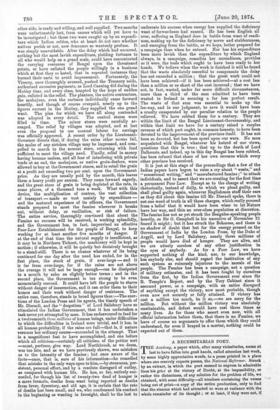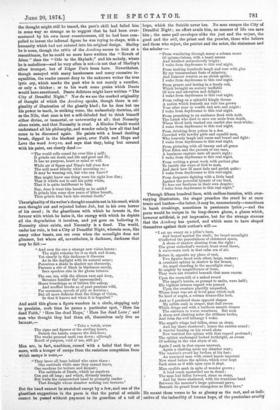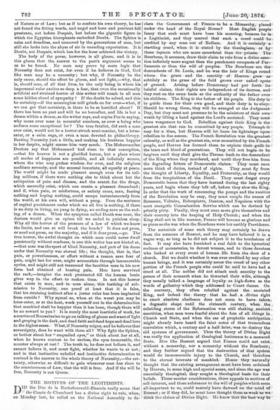HE Academy, a paper which, after many vicissitudes, seems at
the thought might still be traced, the poet's skill had failed him
in some way so strange as to suggest that he had been over- mastered by his own inner consciousness, till he had been com- pelled to invest the infernal figure he was trying to shape, with a humanity which had not entered into his original design. Shelley he is none, though the critic of the Academy seems to hint at a resemblance, for he could no more have written the "Revolt of Islam" than the "Ode to the Skylark ;" and his melody, where he is melodious—and he very often is not—is not that of Shelley's
silver trumpet, but of Edgar Poe's brass horn. Nevertheless, though annoyed with many harshnesses and many excessive in- equalities, the reader cannot deny to the unknown writer the true lyric cry, which marks the poet who is not merely a versifier, or only a thinker ; or to his work some praise which Dante would have sanctioned. Dante delirious might have written "The City of Dreadful Night." Nor do we see the marked originality
of thought of which the Academy speaks, though there is ori-
ginality of illustration of the ghastly kind ; for he does but use his power to teach, in striking verse, the melancholy doctrine, old
as the Nile, that man is but a self-deluded fool to think himself either divine, or immortal, or noteworthy at all ; that Necessity alone exists, and that Necessity is cruel. A Hindoo Pundit would understand all his philosophy, and wonder calmly bow all that had come to be discussed again. He paints with a broad daubing brush, dipped in the blackest paint, over Faith and Hope and Love the word Avayz4, and says that they, being but covered
with his paint, are clearly dead :—
" The world rolls round for over like a mill;
It grinds out death and lifo and good and ill; It has no purpose, heart or mind or will.
While air of Space and Time's full river flow The mill must blindly whirl unresting so: It may be wearing out, but who can know ?
Man might know one thing were his sight less dim; That it whirls not to suit his petty whim, That it is quite indifferent to him.
Nay, does it treat him harshly as he saith?
It grinds him some slow years of bitter breath, Then grinds him back into eternal death."
The originality of the writer's thought consists not in his creed, which men thought out and rejected before Job, but in his own horror of his creed ; in the ghastliness with which he invests it, the fervour with which he hates it, the energy with which he depicts all the degradation it involves, and yet goes on believing it. Necessity alone exists, and Necessity is a fiend. The world, under her rule, is but a City of Dreadful Night, wherein men, like many other beasts, can see even when the moonlight does not glimmer, but where all, nevertheless, is darkness, darkness that may be felt :—
" And soon the eye a strange new vision learns :
The night remains for it as dark and dense, Yet clearly in this darkness it discerns As in the daylight with its natural sense; Perceives a shade in shadow not obscurely, Pursues a stir of black in blackness surely, Sees spectres also in the gloom intense.
The ear, too, with the silence vast and deep, Becomes familiar tho' unreconciled; Hears breathings as of hidden life asleep, And muffled throbs as of pent passions wild, Far murmurs, speech of pity or derision ; But all more dubious than the things of vision,
So that it knows not when it is beg-ailed.'
And amid this gloom a figure wanders in a circle, stopping only to proclaim, each time he passes a particular spot, 'Here lies dead Faith,' 'Here lies dead Hope,' 'Here lies dead Love ;' and men who thought they had them all, themselves only live on because,—
" Take a watch, erase The signs and figures of the circling hours, Detach the hands, remove the dial-face; The works proceed until run down; although Bereft of purpose, void of use, still go."
Men are, in fact, machines, cursed with a belief that they are more, with a hunger of escape from the resistless compulsion from which escape is none,—
" They leave all hope behind who enter there :
One certitude while sane they cannot leave, One anodyne for torture and despair; The certitude of Death, which no reprieve Can put off long; and which, divinely tender, But waits the outstretched hand to promptly render That draught whose slumber nothing can bereave."
But the hand cannot be stretched except by a few, and one of the ghastliest suggestions in the poem is that the portal of suicide cannot be passed without payment to its guardian of a toll of hope, which the Suicide never has. No man escapes the City of Dreadful Night ; no effort avails him, no manner of life can save him ; the same pall envelopes alike the just and the unjust, the good and the evil, the priest and the prowler, those who believe and those who reject, the patriot and the actor, the statesman and the scholar :—
" From wandering through many a solemn scone Of opium-visions, with a heart serene
And intellect miraculously bright: I wake from daydreams to this real night.
From making hundreds laugh and roar with glee By my transcendent feats of mimicry, And humour wanton as an elvish sprite : I wake from daydreams to this real night.
From prayer and fasting in a lonely cell, Which brought an ecstasy ineffable Of love and adoration and delight: I wake from daydreams to this real night.
From ruling on a splendid kingly throne A nation which beneath my rule has grown Year after year in wealth and arts and might : I wake from daydreams to this real night.
From preaching to an audience fired with faith The Lamb who died to save our souls from death, Whose blood bath washed our scarlet sins wool-white: I wake from daydreams to this real night.
From drinking fiery poison in a den Crowded with tawdry girls and squalid men, Who hoarsely laugh and curse and brawl and fight: I wake from daydreams to this real night.
From picturing with all beauty and all grace First Eden and the parents of our race, A luminous rapture unto all men's sight : I wake from daydreams to this real night.
From writing a great work with patient plan To justify the ways of God to man, And show how ill must fade and perish quite : I wake from daydreams to this real night.
From desperate fighting with little band Against the powerful tyrants of our land, To free our brethren in their own despite : I wake from daydreams to this real night."
Through fifteen hundred lines, with endless iteration, with ever- varying illustration, the singer preaches the creed he at once trusts and loathes—the latter, it may be, unconsciously—sometimes in harsh croakings, sometimes in passionate lyrics ;—and the poem would be unique in its long-drawn gloom, a gloom which, however artificial, is yet impressive, but for the strange stanzas that the Academy has quoted, and which seem to have shaped themselves against their author's will :- "I sat me weary on a pillar's base,
And leaned against the shaft; for broad moonlight O'erfiowed the peacefulness of cloistered space, A shore of shadow slanting from the right : The great cathedral's western front stood there, A wave-worn rock in that calm sea of air.
Before it, opposite my place of rest, Two figures faced each other, largo, austere; A couchant sphinx in shadow to the breast, An angel standing in the moonlight clear; So mighty by magnificence of form, They were not dwarfed beneath that mass enorm.
Upon the cross-hilt of a naked sword The angel's hands, as prompt to smite, were held; His vigilant intense regard was poured Upon the creature placidly unquelled, Whose front was set at level gaze which took No heed of aught, a solemn trance-like look.
And as I pondered these opposed shapes My eylids sank in stupor, that dull swoon Which drugs and with a leathern mantle drapes The outworn to worse weariness. But soon A sharp and clashing noise the stillness broke, And from the evil lethargy I woke.
The angel's wings had fallen, stone on stone, And lay there shattered ; hence the sudden sound: A warrior leaning on his sword alone Now watched the sphinx with that regard profound The sphinx unchanged looked forthright, as aware Of nothing in the vast abyss of air.
Again I sank in that repose unsweet, Again a clashing noise my slumber rent ; The warrior's sword lay broken at his feet : An unarmed man with raised hands impotent Now stood before the sphinx, which ever kept Such mien as if with open oyes it slept.
Mine eyelids sank in spite of wonder grown ; A loud crash upstartled mo in dread: The man had fallen forward, stone on stone, And lay there shattered, with his trunkless head Between the monster's large quiescent paws Beneath its grand front changeless as life's laws."
He meant those verses to be as gloomy as the rest, and as indi- cative of the imbecility of human hope, of the passionless cruelty of Nature or of Law; but as if to confute his own theory, be has not found the fitting words, and angel and hero and penitent fall prostrate, not before Despair, but before the gigantic figure in which the Egyptian hierophants embodied Doubt. The Sphinx is calm and dreadless, and unmoved by the generations of men, but still she looks into the abyss of air in unending expectation. It is Doubt, not Despair, which has for the hour achieved the victory.
The body of the poem, however, is all gloom, and it is in this gloom that the answer to the poet's argument seems to us to be found. No man may prove by mere logic that Necessity does not exist, for even if he . believes in God, God like man may be. a necessity ; but why, if Necessity be the only cause, should the effect be gloom, and not light,—why, that is, should man, of all that lives, be the only being in whom his impersonal ruler excites so deep a fear, that even the occasionally artificial and strained horror of this writer will touch in all men some hidden chord of sympathy ? If the-doubt be solved, and this be certainty—if the meaningless mill grinds on for ever—what, if we can get that certainty, is there to be so horrified about? If there has been no past and will be no hereafter, and life is but a dream within a dream, as the writer says, and copies Poe in saying, why moan over man in mournful numbers, as over a being who endures some exceptional lot ? The true fatalist, did such a man ever exist, would not be a horror-struck semi-maniac, but a lotus- eater, or a calm sage, or even a man devoted to philanthropy. Beating Necessity just, a little, and making his brethren happier in her despite, might amuse him very much. The Mohammedan Doctors say that MOhammed had risen to that conception, —that his heaven is not a glorified harem, but a place where all modes of happiness are possible, and all infinitely secure, where the wise may gather wisdom for ever, and the religious meditate serenely, and the sensual luxuriate, all equally at peace. The world might be made pleasant enough even for its toil- ing millions, if there were nothing else to think about but the extirpation of pain and disease, and the search for the drugs, which assuredly exist, which can create a pleasant dreamland ; and if, when pain, or misfortune, or satiety came, man, fearing nothing and hoping nothing, could escape instantaneously from the world, at his own will, without a pang. Even the sentence of capital punishment under which we all live is nothing, if there is no duty in living, no pang in dying, no ending save as the end- ing of a dream. When the symptom called Death was near, the doctors would give us opium till we ended in painless sleep. Why all this horror of the pressure of a law of which we know the ]imits, and can at will break the bonds? It does not press, or need not press, on the majority, and if it does press,—go. The true horror, the awful thought on which man could never dwell persistently without madness, is one this writer has not hinted at, —that man was the sport of blind Necessity, and part of his doom under that Necessity was eternal life ; the thought, that is, that pain, or powerlessness, or effort without a reason save fear of pain, might last for ever, might accumulate through innumerable cycles, and might still not transcend the faculties man in his new form had obtained of bearing pain. Men have survived the rack,—imagine the . rack protracted till the human brain gives way in the effort to reckon time. Is not this horror that exists in man, and in man alone, this loathing of sub- mission to Necessity, one proof at least that it is false, that his straining instinct after a juster ruler has been implanted from outside ? Why squeal so, when at the worst you may be lotoe-eater, or at the best, work yourself out in the determination that mankind shall be happier than it has been, though there will be no reward to you ? It is surely the most inartistic of work, for a convinced Necessitarian to go on talking of gloom and want of light and groping in the dark, and dead faith and dead hope and dead love in the higher Dense, What, if Necessity reigns, and he believes that sovereignty, does he want with them all ? Why fight the Sphinx, or bother about her " unquelled eyes," or think about her at all, when he knows contest to be useless, the eyes immovable, the monster always at rest? The truth is, he does not believe it, and without cannot believe it, and must fight, whether he wants to or not ; and they and in that instinctive unbelief and instinctive determination to would do




































 Previous page
Previous page